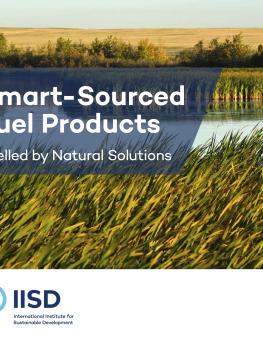
Smart-Sourced Fuel Products
Many different types of “waste” or under-used plant materials can be turned into value-added bioenergy fuel products. This brochure, available in both English and French, focuses on such materials available in Manitoba, Canada, including agricultural residues, forestry residues, grassland plants and wetland plants.
Many different types of “waste” or under-used plant materials can be turned into value-added bioenergy fuel products.
This brochure, available in both English and French, focuses on such materials available in Manitoba, Canada, including agricultural residues, forestry residues, grassland plants and wetland plants. In particular, it outlines some of the fuel products IISD has developed with partners: fuel pellets, briquettes, cubes, biochar, biogas and fuel logs. It also discusses current market conditions, existing and potential users, socioeconomic and environmental benefits of this approach, and total biomass availability estimates for the province.
IISD analysis has shown that some of these non-traditional fuel options have advantages over traditional sources, including higher yield per hectare, faster maturity, comparable or better heating values and water quality benefits when nutrients are captured in harvested plant materials. An estimated 1 million gross tonnes of biomass residues and cattail can be found within 100 kilometres of both Winnipeg or Brandon, presenting an opportunity for further growth of these low-carbon fuel sources in Manitoba.
Participating experts
Additional downloads
You might also be interested in
Canada Should Copy Europe When It Comes to the Bioeconomy
The recently announced EU Bioeconomy Strategy continues that continent’s legacy of advancing biological solutions to environmental questions and strategically highlights the economic benefits of the approach with a strong focus on jobs, growth and investment.
Nature's wealth: Wetlands as filters, fuel, flood protection and food
This publication explores the many benefits of wetlands and showcases examples of how Manitobans enjoy and use these areas.
INC-4 Is an Opportunity to Address Fresh Water Pollution – This is how
INC-4 is the fourth meeting in a series of international negotiations that aims to develop a global treaty on plastic pollution that could and should have big implications for freshwater quality both in Canada and beyond.
Northwest Ontario Side Story: IISD Experimental Lakes Area Annual Report 2022-2023
This year's annual report is a celebration of all things creative at the world's freshwater laboratory, from the science to music, photography and theatre.